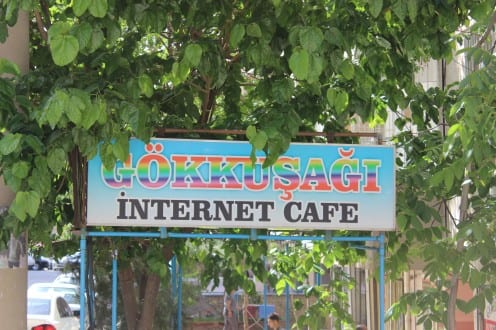Facebook and the threat to individual expression
By Elisabetta Costa, on 12 August 2013

Photo: Elisabetta Costa
Again the topic of privacy seems be central in my field-site that I call here “Dry Rock Town”. During the first few months in Dry Rock Town, I’ve already noticed a pattern that can bring me to make a simple generalization: people do not usually update their status on Facebook. And on the occasions when they do update their status, they quote the sentence of some famous writers, poets, singers or actors, or they write some famous proverbs. Comments on private or public life, observations about politics or about food, general thoughts on everyday life, expression of feelings and emotions are never publicly expressed on the Facebook wall. I met guys that were using Facebook many hours a day, sharing hundreds of posts and making thousands of “like” every month, buy they have never written a thing on their wall. It’s not because people don’t like to write on Facebook. Indeed the inhabitants of Dry Rock Town usually make a lot of comments on their friend’s posts or pictures. And it’s not even because people are not well educated and thus not able to write properly: many of my informants have high-school or university degrees. It is not because people do not want to give information about their private life: people love to post pictures portraying them on holiday or at dinner out with families or friends. And it’s not even because people are afraid to expose their ideas. People usually share a lot of political posts.
But the inhabitants of Dry Rock Town usually do not write on their wall what they think. How can we understand this data? Defending one’s own reputation is the most important thing here and the public expression of personal thoughts can become a very dangerous practice. It exposes the person to the judgment and to the critics of others and consequently to the loss of reputation. It’s more convenient to express personal opinions through the words of authoritative others that can not be so easily criticized. People do not usually write comments on topic of public interests. They just share a quotation, news or pictures. And this point can be very interesting as it contradicts the conclusion of the main literature on the impact of new media in the Middle-East, that emphasize the role of digital and social media in promoting a greater role of the individual against established authorities (among others see Eickelman and Anderson 2003, Hofheins 2011, Lynch 2007). Indeed I believe that in a highly normative and conformist society, Facebook is having the opposite effect as it constitutes a continuous threat to the respectability of the people by making public, visible and permanent what does not necessarily adhere to the social norms. And as reaction people try to follow even more the established social norms and authorised discourses, wherever they come from, the government, the political parties, newspapers or Greek philosophers. If nobody writes comments on topic of public interest, at the same time nobody writes comments about private life. Here the clear division between private and public sphere typical of Muslim societies is self-evident. Facebook makes the private public and thus it constitutes a continuous threat to the honour of families in a society where honour killings are frequent and alive.
I really believe that in the next months I will investigate more on the role of Facebook in promoting daily-life practices that adhere to instituted social norms and to established authorities, far from creating a sphere where individual are more free to openly discuss issues of public or private interest. But the most interesting thing is that this Facebook ‘s effect goes parallel with the opposite one: publicly the inhabitants of Rock Dry Town follow and reinforce established social norms, but privately and secretly they are involved in private communicative practices such as chatting and flirting between men and women, that are totally new, different and that subvert old social norms.
References:
Eickelman, D. and Anderson J. 2003. New media in the Muslim world. Indiana University Press.
Hofheinz A., 2011 Nextopia? Beyond the revolution 2.0, International journal of communication.
Lynch, M. 2007. Blogging the new Arab public. Arab Media and Society.
 Close
Close




